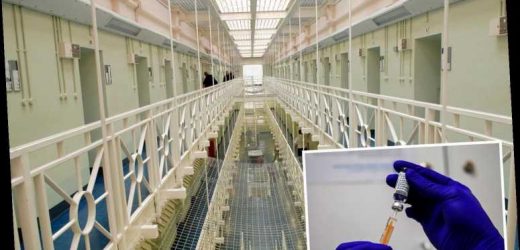PRISONERS should get priority when its comes to Covid jabs as they're three times more likely to die from the virus, experts have claimed.
Researchers at University College London (UCL) said most prisoners have poor health and also have greater exposure to the virus.
? Read our coronavirus live blog for the latest news & updates…
The experts highlighted that prison staff should also be given priority when it comes to vaccinations.
So far in the UK over 25 million Brits have received a first dose of either the Pfizer/BioNTech jab or the Oxford/AstraZeneca offering with over 1.6 million having had their second.
The priority list is set out by the JCVI (Joint Committee on Vaccination and Immunisation).
As vaccine were authorised it was decided that the most vulnerable in society would receive the vaccine first.
This meant that people of the age of 80 would get the jab first, with old age being the primary risk of severe cases of Covid.
Care workers and people who work within the NHS were also at the top of the list as they are more likely to be exposed to the virus.
A new study, published in The Lancet, highlights that prisoners would benefit in more ways that one if they were to receive the jab.
A team led by Dr Isobel Braithwaite said that earlier vaccination for prisoners would protect their health and would also restore their access to rehabilitation programmes and family visits.
This, the team said would prevent them from reoffending.
The study states that deaths are three times higher in prisons compared to people of a same age and sex outside secure environments.
In prisons in England and Wales between March 2020 and February 2021 there were 118 deaths related to Covid-19.
Cases of the virus are also higher in prisons, with 7.6 cases per 1,000 people in prisons, compared to 4.9 per 1,000 across the general population.
While rates of Covid-19 are falling in most areas, in some they have risen in the last week and some experts have put this down to outbreaks in prisons.
One example is cases in Leeds, which in the last week have gone up 5.1 per cent.
The local council has said this is due to outbreaks in two prisons in the city, HMP Leeds and HMP Whealstun.
Other areas such have Norfolk, have also now said that the rate of infections first reported had been far off the mark.
Local media reported that 600 prisoners and 250 staff in Norfolk’s three prisons caught the virus over the winter months.
A spike in cases in the Derbyshire Dales was also last week put down to an outbreak at HMP Sudbury.
Commenting on the results of the UCL study Dr Braithwaite said: "Our findings show that people in prisons are at a much higher risk of dying from Covid-19 than the general population, and we make the case that both they and prison staff should be given high priority in the rollout of vaccines.
“This has recently been agreed for people experiencing homelessness, who face similarly high risks.
“We believe the current methods of regime restriction are not enough to protect people adequately, and a systematic, ‘whole-prison’ approach to vaccination is key to preventing further outbreaks and reducing overall deaths in prisons.”
Despite the researchers claims, the Ministry of Justice (MoJ) says it has protected the lives of thousands of both prison staff and prisoners alike.
A spokesperson for the MoJ said: "The suggested death rate is highly misleading and fails to take into account tens of thousands of additional offenders who move in and out of prisons every year.
“We have protected the lives of thousands of staff and prisoners – deaths are significantly lower than predicted and cases have fallen for seven consecutive weeks as our strict measures limit the spread of the virus.”
At present there are around 80,000 people in prison in England and Wales.
It is thought that just 10,000 of these prisoners would be prioritised for jabs due to their age or underlying health conditions.
Dr Braithwaite warned that if prisoners were not jabbed, then outbreaks in prisons could seed further infections amongst the general public through family visits and staff potentially taking the virus home and spreading it to their family and friends.
Source: Read Full Article






